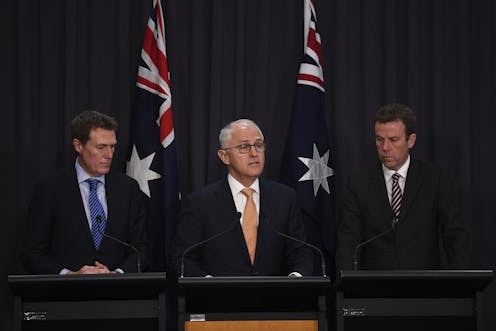Government response to child abuse royal commission is positive, but will need to go beyond an apology
- Written by Timothy W. Jones, Senior Lecturer in History, La Trobe University

The federal government has announced it will establish a National Office for Child Safety and issue a formal apology as part of its response to the Royal Commission into Institutional Responses to Child Sexual Abuse.
In addition, every state and territory has committed to join the National Redress Scheme. Australia’s major churches and youth organisations have also joined the scheme.
The timing of the announcement meets a commitment of the Council of Australian Governments to respond to the recommendations of the Royal Commission’s final report by June 2018. However, the apology, the lead item of this announcement, will not be issued until October 22, 2018, to coincide with national children’s week.
The Royal Commission made 409 recommendations in total. Of these, 84 deal with redress, which the government is addressing in the National Redress Scheme, due to commence next month. Of the remaining 122 recommendations directed at the Australian government, 104 have been accepted and 18 remain under review. None has so far been rejected.
Read more: Royal commission recommends sweeping reforms for Catholic Church to end child abuse
Survivors of abuse consistently state that they want recognition and redress for the past harms and injustices that were done to them.
Recognition
One of the most disturbing elements in the history of child sexual abuse is our capacity, as a society, to be in denial. As I have written elsewhere, we have myriad techniques of keeping disturbing knowledge at bay: there are many ways of not knowing.
We can deny that something happened, we can deny that we understood what happened, and we can deny the legal and moral implications that follow an event. All of these forms of denial are seen in the history of child sexual abuse.
Thankfully, all of these forms of denial were combated by the Royal Commission. You could say it was a momentous exercise in recognition: it brought horrific abuses into public consciousness; it treated survivors of abuse with great dignity and respect; and, it made a comprehensive series of recommendations to deal with the legal and moral implications of the public recognition of this history of abuse.
Through its 57 public case studies, 8,013 private sessions, and over 68,000 calls, letters and emails received, the commission established beyond any doubt the reality and the gravity of Australia’s history of institutional abuse.
Redress
Recognising this history brings legal and moral implications for its redress. So far, the government has responded with uncharacteristic alacrity in accepting and implementing the key recommendations of the Royal Commission.
But justice for historic offences is not simple, and I await with interest the responses of child sex abuse survivor groups to the government’s announcement.
For most people, justice looks like punishment for the guilty. The Royal Commission has referred over 2,500 matters to police for investigation. In recent times, we have seen some prominent cases go to trial, including the most senior Roman Catholic yet to face charges of child sex crimes, Cardinal George Pell.
The National Redress Scheme is the flagship instrument of redress emerging in the wake of the Royal Commission. Legislation has passed the lower house and is now before the Senate. It proposes average payments to victims of $76,000, with maximum payments of $150,000.
These amounts are lower than amounts typically awarded in civil courts in Australia, and significantly lower than settlements awarded in some international jurisdictions.
However, the lower standards of evidence required to be awarded a settlement through the redress scheme, relative to standards in criminal or civil law, and being able to avoid cross-examination in court, may make this option more attractive for many survivors. The redress scheme provides access to counselling and psychological services, and provides an option for survivors to receive a direct personal response from the responsible institution.
Australian jurisdictions are also reforming laws to make it easier to sue churches and other institutions.
The establishment of a National Office for Child Safety, along with a raft of national standards and safety frameworks, is heartening.
Apology
The fact is, though, that most of the institutions in which the majority of the historic abuse unearthed by the Royal Commission occurred no longer exist. The institutions of “care” run by churches and the states - orphanages, missions, boarding schools - have largely been disbanded.
Ironically, most current child removal and child trauma can be found at a site for which we have already had an apology, but for which redress has been woefully inadequate. The 1997 Bringing Them Home report into the Stolen Generations opened up public inquiry into child abuse in Australia.
The comprehensiveness of the Child Abuse Royal Commission, and the government’s promised response, is heartening. But as the Stolen Generations apology painfully illustrates, apologies without action become empty, bitter words.
Let’s hope that the apology to victims of institutional abuse, to be delivered in October, is well crafted, and sincerely delivered. And that substantial redress is delivered.
Authors: Timothy W. Jones, Senior Lecturer in History, La Trobe University





